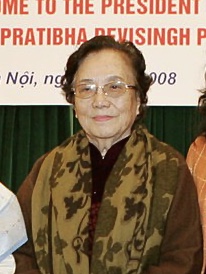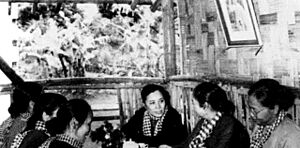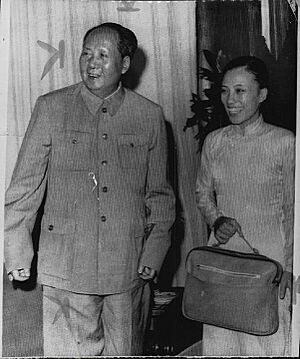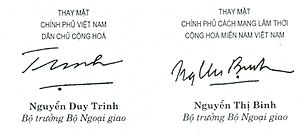Nguyễn Thị Bình facts for kids
Quick facts for kids
Her Excellency
Nguyễn Thị Bình
|
|
|---|---|

Thị Bình in 2008
|
|
| 13th Vice President of Vietnam | |
| In office September 10, 1992 – August 8, 2002 |
|
| Preceded by | Nguyễn Thị Định |
| Succeeded by | Trương Mỹ Hoa |
| 2nd Chair of the National Assembly Foreign Affairs Committee |
|
| In office February 16, 1987 – September 9, 1992 |
|
| Preceded by | Vũ Quang |
| Succeeded by | Hoàng Bích Sơn |
| 6th Minister of Education | |
| In office July 3, 1976 – February 15, 1987 |
|
| Preceded by | Nguyễn Văn Huyên |
| Succeeded by | Phạm Minh Hạc |
| 1st Minister of Foreign Affairs (Provisional Revolutionary Government) |
|
| In office June 8, 1969 – July 2, 1976 |
|
| Preceded by | Office established |
| Succeeded by | Office abolished |
| Personal details | |
| Born |
Nguyễn Thị Châu Sa
26 May 1927 Châu Thành, Sa Đéc Province, Cochinchina, French Indochina (now in Đồng Tháp Province, Vietnam) |
| Political party | Communist Party of Vietnam |
| Other political affiliations |
People's Revolutionary Party of South Vietnam (1962–1975) |
| Relations | Phan Châu Trinh (grandfather) |
| Signature | |
| Nicknames | Madame Bình Yến Sa |
Nguyễn Thị Bình (born Nguyễn Thị Châu Sa on May 26, 1927), also known as Madame Bình, is a famous Vietnamese leader. She was a key diplomat and politician. She became well-known around the world for her role in the Paris Peace Accords. These were important talks to end the Vietnam War.
Madame Bình was the only woman to sign the 1973 peace agreement. This agreement helped end the war. After the war, she worked in the government of Vietnam. She later became the country's Vice President in 1992. She was the first woman in Vietnamese history to become a cabinet minister.
Contents
Early Life and Education

Nguyễn Thị Bình was born in 1927 in Châu Thành, Vietnam. Her grandfather was a famous leader named Phan Chu Trinh. She studied French in Cambodia. Later, she worked as a teacher. This was during the time when France ruled Vietnam.
She joined Vietnam's Communist Party in 1948. From 1945 to 1951, she took part in movements against French rule. She was arrested and put in jail by the French from 1951 to 1953.
Role in the Vietnam War

During the Vietnam War, Nguyễn Thị Bình was an important member of the Vietcong. She was also a leader in the South Vietnamese Women's Liberation Association. In 1969, she became the foreign minister for the Provisional Revolutionary Government of the Republic of South Vietnam.
She spoke French very well. This helped her play a big part in the Paris Peace Accords. This agreement was meant to end the war and bring peace to Vietnam. It started on January 17, 1973. Madame Bình became a very visible international figure. People often called her "Madame Bình" because of her elegant style. She was the only woman who signed the Paris Peace Accords.

After the War and Later Career
After the Vietnam War, Nguyễn Thị Bình became the Minister of Education for the Socialist Republic of Vietnam. She held this role from 1976 to 1987. This made her the first female minister in Vietnam's history.
She was a member of the Central Committee of Vietnam's Communist Party from 1987 to 1992. She also led the National Assembly's Foreign Affairs Committee. The National Assembly chose her twice to be the Vice President of Vietnam. She served two terms, from 1992 to 1997 and from 1997 to 2002.
After she retired from politics, Madame Bình wrote articles for newspapers. In one article, she shared her worries about how the Communist Party chose its members. She felt that some people who were not good enough were joining the party. She also thought the party focused too much on having many members instead of good quality members.
From 2009 to 2014, she was part of a committee for the Russell Tribunal on Palestine.
Legacy and Recognition
Madame Bình has inspired many people. A group of women artists in New York City, active from the 1970s to 1980s, named themselves the "Madame Binh Graphics Collective" after her. They created posters and street art.
She has received many important awards. These include the Order of Ho Chi Minh and the Resistance Order (First Class). In 2021, the President of Vietnam gave her the 75-year Party Membership Commemorative Medal. This honored her long service to the Communist Party.
To celebrate the 75th anniversary of Vietnam's Ministry of Foreign Affairs, official pictures were made for 12 former foreign ministers. Nguyễn Thị Bình was one of them. She was the only foreign minister from South Vietnam and the only woman included.
See also
 In Spanish: Nguyễn Thị Bình para niños
In Spanish: Nguyễn Thị Bình para niños
 | Delilah Pierce |
 | Gordon Parks |
 | Augusta Savage |
 | Charles Ethan Porter |

